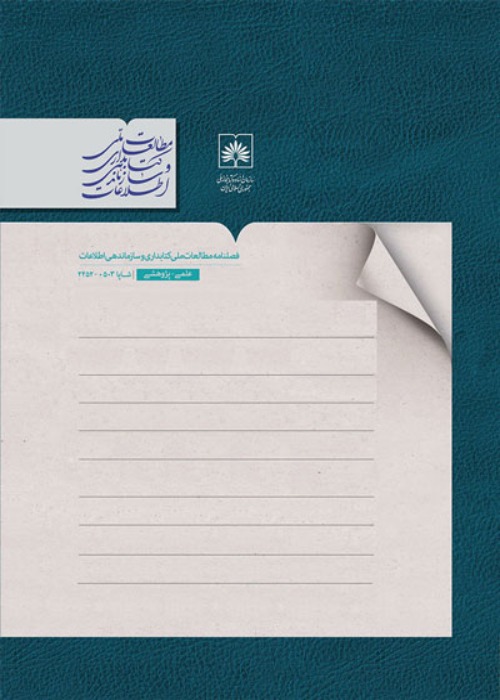Critical Analysis of the Iranian Expansions of Dewey Decimal Classification Edition 22
Author(s):
Abstract:
Purpose
The aim of this research was to critically study the Iranian expansions of the Dewey Decimal Classification in three sections i.e. standard subdivisions, the schedules, and the relative index. Methodology/Approach: This is a developmental research based on records and comparisons. Findings
Despite the claim that the Iranian literature expansion is up-to-date and matched to the 21st edition of the Dewey Classification, in the standard subdivision table of this expansion, 80.30 percent of the numbers together with the expressions in front of them have changed in comparison with edition 21 of Dewey Classification. In the schedules, general principles are similar to those of Dewey edition 18, while this structure has significantly altered in Edition 22. The expansion of Islam also indicates the differences between the structure and numbers presented in this expansion for the Islam subject field and the structure and numbers available in the Dewey in its present edition i.e. edition 22, for this field. The third edition of the Iran History expansion, as its introduction claims, had been compared with Dewey 21 and edited wherever required. 89.47 percent of the numbers in the history expansion have completely changed in comparison with edition 20 and 88.38 have completely changed compared with Edition 21. The last edition of the Iranian languages expansion (i.e. edition 2) conforms to Dewey Edition 19. Statistical findings from the standard subdivisions tables show that 27.86 percent of the numbers in the Iranian languages expansion have undergone significant change compared with Dewey Edition 19. Analysis of the schedules of literature, history, and Iranian languages expansions along with comparisons with the main outline of the Dewey classification in classes 800, 900, and 400 and comparing them with structures of schedules in the literature, history, and Iranian languages expansions indicate a limit in numbering through the literature, history, and Iranian languages expansions. Conclusion
The Iranian expansions of the Dewey classification need to be updated based on the universal approach used in the main text of the Dewey classification. By implementing the suggestions of this research the Iranian expansions may be combined into one volume. Some suggestions are provided for changing the structure of schedules of these expansions and therefore improving the status of numbering by them.Keywords:
Language:
Persian
Published:
Librarianship and Informaion Organization Studies, Volume:23 Issue: 4, 2013
Page:
40
magiran.com/p1100137
دانلود و مطالعه متن این مقاله با یکی از روشهای زیر امکان پذیر است:
اشتراک شخصی
با عضویت و پرداخت آنلاین حق اشتراک یکساله به مبلغ 1,390,000ريال میتوانید 70 عنوان مطلب دانلود کنید!
اشتراک سازمانی
به کتابخانه دانشگاه یا محل کار خود پیشنهاد کنید تا اشتراک سازمانی این پایگاه را برای دسترسی نامحدود همه کاربران به متن مطالب تهیه نمایند!
توجه!
- حق عضویت دریافتی صرف حمایت از نشریات عضو و نگهداری، تکمیل و توسعه مگیران میشود.
- پرداخت حق اشتراک و دانلود مقالات اجازه بازنشر آن در سایر رسانههای چاپی و دیجیتال را به کاربر نمیدهد.
In order to view content subscription is required
Personal subscription
Subscribe magiran.com for 70 € euros via PayPal and download 70 articles during a year.
Organization subscription
Please contact us to subscribe your university or library for unlimited access!



